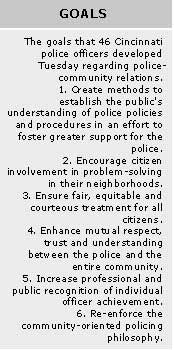The Cincinnati EnquirerOfficers see need for change in attitudesBy Kristina Goetz, November 14, 2001They feel insulted, angry, frustrated and think the public often doesn't understand what they do.For the first time since the April riots and the Department of Justice investigation into the Cincinnati Police Division's patterns and practices, officers publicly discussed their ideas Tuesday for better police-community relations. |
 
|
| The session, led by Aria Group, a Yellow Springs-based
conflict resolution firm, is part of an effort to mediate a federal racial-profiling
lawsuit filed against the city in March. "Everybody's heard the saying, "If it's not broken, don't fix it,'" said Sgt. Tony Shearer, who works in the division's training academy. "We have some things that are broken. We have some things that need to change." There was a wide range of opinions among the 46 officers who participated in the session. Some think racial profiling is a problem; others think it's a matter of perception. A good many want more positive coverage from media they say have not focused enough on the good things they do for the community. |
 |
|
And while they want people to have a better understanding of their policies
and procedures, some agreed that officers need to be more courteous to
citizens. "We need to find out why that perception is there," said Officer Don Meece, who works in District 4, which includes neighborhoods such as Roselawn, Avondale and Bond Hill. "Not one time have I ever seen a single co-worker stop someone because of their race." He thinks a lot of what the African-American community sees as racial profiling is bad service or discourtesy. After every traffic stop, Officer Meece said, officers need to explain to citizens why they were stopped and apologize for inconveniencing them if they were not the suspects police were seeking. "If we learn to do that a little bit better, then some of the perceptions will go away," Officer Meece said. Spc. Jim Perkins wants more people to realize that police are part of the community and that they often give back in ways many citizens never know about. "I'm here to protect our image," Spc. Perkins said. "We deal with only 5 percent of the population in a bad light." The other 95 percent either have positive interactions with police or none at all. And those who don't are influenced by what they see on television, he said. Until people know the sacrifices officers make and that there are many heroes, the public won't see both sides, the officers said. "Then we can start the healing process," Spc. Perkins said. Ideas from this meeting, along with thousands of others from surveys collected by Aria Group - and during meetings with African-Americans, business leaders, white citizens and others - will eventually become part of a settlement agreement. The parties in the racial-profiling lawsuit will debate that agreement in December or January. It will be presented to a federal judge in February for approval. top |
|